Tag Archives: Desmond Llewelyn
Tomorrow Never Dies (1997)
GoldenEye (1995)
Licence to Kill (1989)
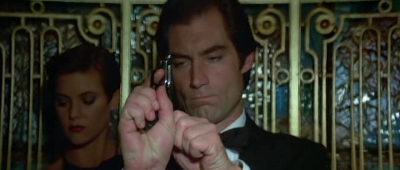
By now, EON Productions had these Bond films running on a rock-solid two year schedule. Writers Richard Maibaum and Michael G. Wilson seemed to have hit upon a winning formula: fuse the few remaining pieces of Fleming’s short stories together with plot elements “torn straight from the headlines of today’s newspapers.” This served the twin purpose of keeping James Bond “relevant” to a changing movie landscape and shaking up the stale formulas that had constrained the series for two decades.
Inevitably, the loudest criticisms of The Living Daylights and its sequel come from Bond fans who felt (and still feel) this series grand quest for “relevance” was a whole lot of tilting at windmills. The Dalton Era gets a lot of flack for a lot of things, but nothing more so than its lack of “fun”; that “campy” “charm” which supposedly made the Moore Era so much more “enjoyable” and the Connery films “instant classics.” Gods forbid anyone treat those like “serious” spy-fi action pictures…even if that’s exactly what they were intended to be.
They succeed on their own merits with no “camp,” required, save the kind the audience brings with it via the expectations in their heads. If you want real “camp,” I’ve got a version of Casino Royale you should check out (no, not that one)…me, I think Bond should’ve gone “darker” decades before he actually did. He might’ve stayed ahead of the trends instead of constantly playing catch-up. Licence to Kill almost does this and, on the strength of that almost, becomes my favorite Bond film of its decade…and the preceding one. Continue reading Licence to Kill (1989)
The Living Daylights (1987)
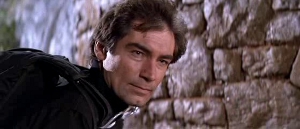
Introduction: Why Novels Are Better Than Films (Bond)
Enter Timothy Dalton, to the collective dismissal of a generation. Not my generation, mind – I was four at the time and at least a year away from achieving what I’d call “consciousness.” I speak of the previous generation of Bond fans Roger Moore created with his twelve year stint in the tux…and the generation before that, who grew to see Moore’s films as a fundamental betrayal of Ian Fleming’s creation and his suave, snarky, seemingly-detached counterpart Sean Connery and Richard Maibaum created.
Neither group seems particularly concerned with the fact Bond-the-character-in-these-films is an empty suit. As with most literary characters, translating Bond into film removes the one thing that made him bearable in prose: third-person-limited narration. Fleming’s novels are built out of it, their prose colored by Bond’s oft-irredeemable opinions on life, the universe, and everything. He’s exactly the type of “stiff-assed Brit” you’d expect to meet in the better clubs of mid-50s London: defiantly prim and proper; fussy and cynical and racist. Always making snap judgments on the most superficial of things*. But also experiencing the full range of human emotion in a way none of his actors can. They don’t have the time – most of their movies are already too long and none of the Connery or Moore films dared pause to show Bond agonize over a decision, or ruminate on a long life of forcing himself to do horrible things to worse people.
[*My favorite of these comes in the novel Moonraker – which had little to do with the movie Moonraker apart from the villain, Hugo Drax. Bond decides Drax is The Villain, not only because the man cheats at bridge, but because he sweats while he does it.] Continue reading The Living Daylights (1987)
A View to a Kill (1985)
For Your Eyes Only (1981)
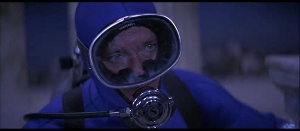
After Moonraker pulled in more money than God, James Bond’s producers could have pushed the envelope even further into self-parody and silliness. Thank your personal gods they didn’t and the Guy Hamilton/Lewis Gilbert aesthetic of tension-free action scenes, idiotic Bond girls and villains unworthy of their gorgeously sets/lairs finally checked out with the Carter Administration. It was so past time to go back to basics even the producers knew it. For a second, it looked as if they were going to go all out and hire a fourth actor for their lead roll, just to top everything off.
Makes sense when you think about it. By this point, James Bond was a bonafide icon and the movie-going world seems to like its icons young. Roger Moore was fifty-four at this point, over a decade older than the First Bond when he quit for the second time. Despite this, For Your Eyes Only is as heavy on the action as anything we’ve seen in this series. It’s also the first straight-up Cold War spy thriller we’ve seen since From Russia with Love. No supervillains! No international extortion! No plots to start World War III! What the hell is going on here? Is this even a James Bond film? Continue reading For Your Eyes Only (1981)
Moonraker (1979)
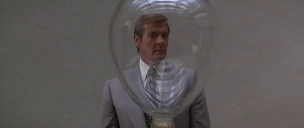
For various reasons, I haven’t been feeling so well lately. And when I feel like shit I like to take it out on bad movies. So I am very glad to be reviewing a Bond film I honestly despise, considered by some people to be The Worst James Bond Movie Ever Made. Of course, things would be pretty boring if it weren’t also acclaimed by almost-as-many people as the quintessential representation of everything this series is, was, or should be. It’s the Bond movie parents think they can safely pass down to their children…especially if their children have a pre-existing interest in sci-fi films, like some of us.
Because of that, it’s the first James Bond movie a lot of people (who aren’t me) see, forever coloring their expectations of the franchise. I’ll admit I’m predisposed to enjoy some of the elements you Normals may find the most ludicrous. But even for me, Moonraker goes right off the rails, abandoning any pretensions of being a spy-fi thriller made for people with functioning brains. In that, and one more area, it is the quintessential Bond movie: things start off well, but get steadily worse as they go on…and this movie does go on. At length. So at least it’s in good company, eh? Continue reading Moonraker (1979)
The Spy Who Loved Me (1977)

“Art from adversity” is a tired cliche at this point, casually bandied about by all manner of creative arts professionals and self-appointed self-help gurus. If those people every wanted a Bond movie to back them up, they could do a lot worse than The Spy Who Loved Me. Nothing went right with this and it still manages to be the best Bond film in eight long years…that must’ve seemed even longer the first time around. No one sacrificed any first born children or danced in circles until the rain came: they simply struck a balance. Spy gets a lot of fan points by following the Bond Formula more faithfully than either of its Moore Era predecessors…but it also racks up a lot of my points ignoring that Formula wherever it sees fit (until the end of course…but we’ll get there).
This is not so inconceivable as you’ve been led to believe. What else are Goldfinger and On Her Majesty’s Secret Service but elaborate permutations of Dr. No? Those three films trace a clear trajectory, pulling the spy-fi genre from its Noir/Thriller roots towards the supervillain-stomping grounds usually occupied by comic book superheroes. The Spy Who Loved Me continues into territory broad enough for the new landscape of Big, Dumb Summer Movies already taking shape in the late 70s. Continue reading The Spy Who Loved Me (1977)
The Man with the Golden Gun (1974)
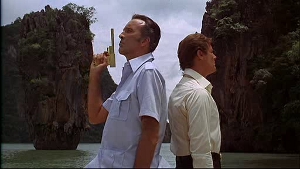
Eleven James Bond novels and one short story collection reached store shelves before their author, Ian Fleming, shuffled off this mortal coil in 1964. The Man with the Golden Gun was one of those unfortunate books you sometimes see after bestselling authors kick it: a rough, unfinished work with no real meat on its bones, rushed to press by hungry publishers who’ve just buried their meal ticket. Perfect material for adaptation to the silver screen, don’t you think? Hell, they made movies out of anything back in the mid-70s. Why I hear some crazy asshole even gave the director of 1941 money so he could go make a giant shark movie…
For his third Bond screenplay in a row, returning writer Tom Mankiewicz junked most of the novel, as he did before in Live and Let Die. Returning director Guy Hamilton didn’t like what Mankiewicz came up with so he called in his old collaborator, Richard Maibaum, for a second draft. You’d think the issue of such veteran talent could only be good. Instead, these three produced the worst film in the franchise (up to this point). Sure, nothing beats Die Another Day nowadays, but after Live and Let Die, the drop off in quality really chapped my ass. Continue reading The Man with the Golden Gun (1974)
